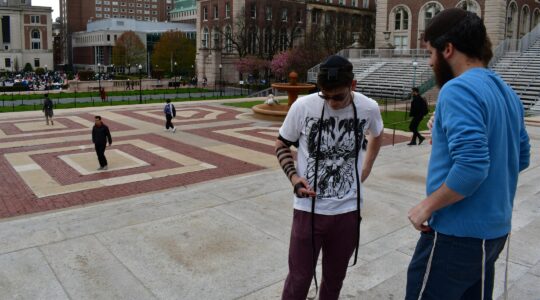NEW YORK (JTA) – Two of the leading gay congregations in the United States are gearing up to publish formal editions of their prayer books, marking the first time that a siddur drafted with the needs of gay and lesbian Jews in mind will be made available to a wide audience.
Congregation Beth Simchat Torah in New York and Congregation Sha’ar Zahav in San Francisco are both expected to publish their prayer books in the coming months.
The books, which evolved from spiral bound volumes the synagogues have used in various forms for years, include modifications to traditional liturgy as well as some innovative original works to be recited at life-cycle moments of particular relevance to gays and lesbians.
“I think that the lesbian-gay community has come of age,” said Jo Ellen Green Kaiser, the project manager for the Sha’ar Zahav siddur. “We’re seeing the same-sex marriage laws. We’re seeing a real sense that we’ve arrived. And there’s a sense of confidence that the community can actually express itself to the general world and be embraced.”
The new books appear at a time of transition for historically gay synagogues. As society at large has grown more tolerant of sexual minorities, mainstream synagogues have become progressively more open to gay and lesbian Jews, causing some to wonder if the notion of a gay synagogue is anachronistic.
Meanwhile, an influx of straight members has led some synagogues, like CBST, to expand their original purpose as a sanctuary for gay and lesbian Jews, further diluting the notion of an exclusively gay synagogue. At Sha’ar Zahav, the three editors who oversaw the prayer-book project are straight.
Those involved in the production of both volumes stress that the books are not exercises in gay sectarianism but were created to appeal to a range of contemporary Jewish experiences that traditional prayers have overlooked.
“There are so many experiences that gay, lesbian, bisexual and transgendered people find in their lives as sacred moments that have been invisible,” said Rabbi Camille Angel of Sha’ar Zahav. “This siddur is our contribution to Jewish history and helps us see ourselves reflected in the text. We’ve retained tradition and adapted tradition, which has always been a Jewish project.”
Though both works include the staples of Jewish worship in traditional form, they also feature liturgical changes that aim to make the service less exclusively male and heterosexual. CBST’s prayer book, Siddur B’chol L’Vav’cha (“With All Your Heart”), for example, compares God’s rejoicing not to a bride and groom, as in the traditional version of the Shabbat evening L’cha Dodi prayer, but to the more general “heart [that] rejoices in love.”
Al Hanisim, a prayer traditionally recited on Chanukah and Purim to recall the miracles God performed in the past, is adapted to a service for “Pride Shabbat” and thanks God for the “miraculous deliverance” of the struggle for gay equality.
CBST’s rendition of the Amidah prayer mentions the biblical Jacob’s concubines, Bilhah and Zilpah – both are mothers of several tribes of Israel, but traditionally they are overlooked because they were partners of lesser legal standing.
“We’re very sensitive to the fact that legal marriage does not exist in our community,” said Rabbi Sharon Kleinbaum of CBST. “And yet family is very important, and this is a way of acknowledging that these women are our matriarchs as much as Rachel and Leah were.”
Sha’ar Zahav’s prayer book goes even further with the Amidah, including several variations to reflect the multitude of orientations within the community – non-believers, women and queers, among others. Worshipers are invited to choose the one they prefer.
“God of oneness, infinite eternal, how queer of you to have created anything at all,” reads the queer Amidah. “God of queerness, in whom are united all separations, we stand before you now queer ourselves made of heaven and earth, day and night, female and male, together all of us within your awesome holy oneness.”
Perhaps the most radical changes are in the Sha’ar Zahav siddur in a collection of blessings meant to consecrate various life-cycle events. In addition to the traditional blessings over food and the like are prayers for the onset of puberty and menopause, a first kiss, taking an HIV test, being single and coming out regarding one’s sexual orientation.
It also includes a prayer for gender transitions, first published last year by the Reform movement, as well as a prayer for anonymous sex titled “Kavanah for Unexpected Intimacy.”
CBST’s prayer book includes readings from poets such as Walt Whitman and Dylan Thomas, as well as from prominent gay Jews like the playwright Tony Kushner and the Broadway composer Stephen Sondheim.
Among Orthodox Jews, many of these changes constitute nothing less than a reinvention of Jewish tradition.
Rabbi Nosson Scherman, the editor of the ArtScroll siddur, the dominant Orthodox prayer book, said adding a reference to Jacob’s concubines was “in effect, rewriting the Torah itself.”
But the books are in line with a growing body of liturgical innovation to emerge in recent years from the progressive wings of the Jewish community. Gender neutrality is now standard practice in Conservative and Reform prayer books, while the new siddur released last year by the Reform movement, Mishkan T’filah, also includes multiple services in recognition of the community’s diversity.
“Someone looking at this is going to find a groundbreaking siddur, graphically and liturgically, that’s so deeply grounded in traditional liturgy, and then wanders off from it,” said Andrew Ramer, a longtime Sha’ar Zahav member who wrote several pieces in the new siddur. “I think that when it’s published, what people will feel is this range of who we are.”





